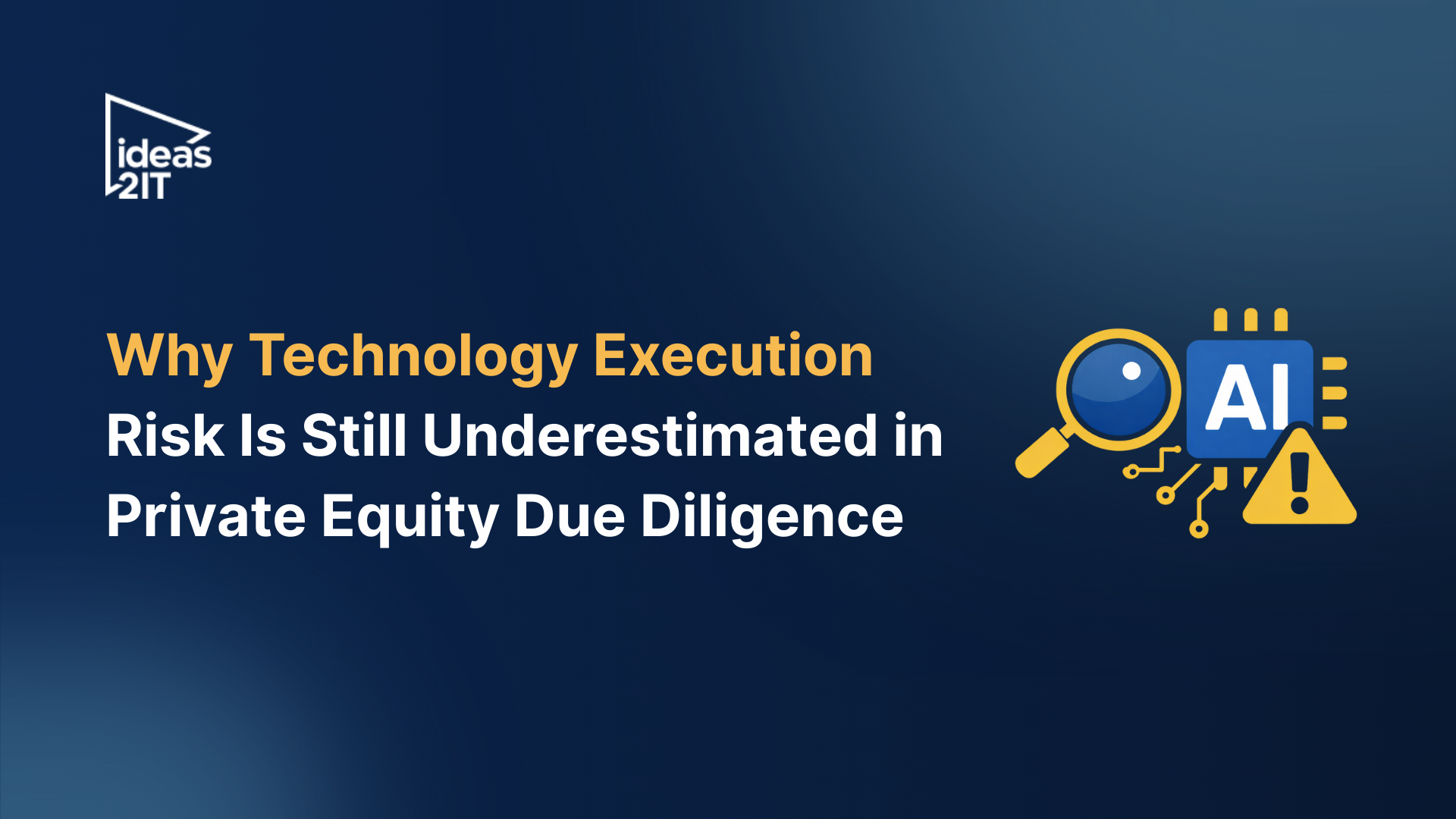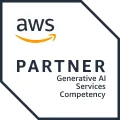Agentic AI in Healthcare: Benefits, Use Cases, and Impact
TL'DR
- The healthcare industry faces critical challenges: workforce shortages, clinician burnout, and operational inefficiencies.
- Traditional AI falls short in integration and proactive decision-making.
- Agentic AI operates autonomously, improving diagnostics, care coordination, and administrative workflows.
- Ideas2IT enables seamless integration of Agentic AI solutions across healthcare verticals.
The healthcare industry is at a breaking point. By 2026, the industry is projected to face a shortfall of 3.2 million workers, further straining an already overburdened system. At the same time, clinician burnout has reached alarming levels, with over 50% of healthcare professionals grappling with stress and exhaustion. This signals a systemic healthcare crisis that impacts quality, access, and clinician well-being. It’s a challenge that affects the well-being of caregivers, reduces patient outcomes, limits access to essential services, and puts healthcare quality at risk.
Summary
Healthcare is overwhelmed by staffing shortages and burnout. Traditional AI offers limited relief due to its task-specific and non-integrative design. Agentic AI addresses this gap with real-time, autonomous support across clinical and operational domains.
While AI is already used in healthcare, most existing solutions are limited to specific tasks and don’t integrate well with essential systems. This leads to inefficiencies instead of easing the workload. Agentic AI takes a different approach. It works within existing infrastructure, helping healthcare organizations manage growing demands by improving decision-making, streamlining operations, and optimizing resource allocation.
The key for healthcare organizations considering Agentic AI is understanding how it fits into their IT systems and daily operations. This guide will cover:
- Agentic AI in Healthcare and Its Applications
- Its Impact on Efficiency, Compliance, and Patient Care
- How Agentic AI Can Transform Healthcare by Solving Key Industry Challenges
With the right approach, Agentic AI has the potential to alleviate the pressure on healthcare professionals, enhance patient outcomes, and contribute to building a more sustainable healthcare system.
Let’s dig deeper into how this transformative technology can solve the key challenges faced by the industry today.
What Is Agentic AI in Healthcare?
Agentic AI is a smarter, more adaptive form of artificial intelligence designed to operate independently, making decisions and taking actions with minimal human input. Unlike traditional AI, which requires constant human intervention, agentic AI systems function autonomously, enabling healthcare providers to make quicker, more accurate decisions based on real-time data, ultimately improving patient outcomes and operational efficiency.
This represents a major shift in healthcare technology. Instead of just automating simple tasks, Agentic AI enables systems to work proactively, handling multi-step processes, anticipating needs, and improving efficiency without constant oversight. By reducing administrative workload, streamlining operations, and enhancing decision-making, it has the potential to reshape healthcare delivery for both providers and patients.
However, AI is not expected to replace human clinicians but to support and enhance their work. By handling routine and administrative tasks, Agentic AI allows healthcare professionals to focus on complex cases, make critical decisions, and engage more with patients, ensuring a balance between efficiency and compassionate care.
At its core, Agentic AI integrates technologies like
- Machine Learning (ML) allows AI to learn from data and improve over time. Instead of needing instructions for every possible scenario, it recognizes patterns and adapts independently.
- Large Language Models (LLMs) help AI understand complex information and generate insights. They allow the system to analyze data, summarize content, and make informed decisions.
- Natural Language Processing (NLP) enables AI to understand and interact with humans. It processes language naturally, making conversations with AI feel more intuitive.
- Knowledge Representation organizes and structures important information. This helps AI use company knowledge effectively to automate tasks and streamline workflows.
- Retrieval Augmented Generation (RAG) enhances AI’s reasoning by giving it access to real-time information. Instead of relying only on what it has learned, it can pull in the latest data to make smarter, more up-to-date decisions.
Bringing LLMs and Multi-Modal Foundation Models together opens new possibilities for healthcare. AI can process complex medical data with greater depth, offering doctors clearer insights and helping patients navigate their health with more confidence.
Summary:
Agentic AI combines foundational models, real-time reasoning, and workflow integration to automate multi-step tasks. It complements human expertise by enhancing clinical decision-making and reducing administrative burden.
Let's explore its practical impact on healthcare.
Applications of Agentic AI in Healthcare
Agentic AI has numerous applications that significantly transform healthcare delivery. These applications fall under key objectives like improving patient care, operational efficiency, and data management. Here are some key applications of Agentic AI in healthcare.
%2520Applications%2520of%2520Agentic%2520AI%2520in%2520Healthcare.png)
1. Diagnostic Applications
AI agents are revolutionizing diagnostic precision by analyzing medical images and patient data using deep learning algorithms. These agents can detect anomalies like tumors with greater accuracy than traditional methods, supporting early detection and more effective treatment.
Examples:
- Radiological Data Specialist Agent: Interprets medical imaging data using AI-driven techniques to detect metastasis and evaluate treatment impact, helping diagnose cancer more accurately.
- Biopsy Data Specialist Agent: Analyzes biopsy reports through digital pathology, calculating Gleason scores and assessing cancer staging. This agent helps determine the aggressiveness of prostate cancer, allowing for more precise treatment planning.
2. Personalized Patient Care
AI agents assist in developing personalized treatment plans by analyzing individual patient data, such as genetics and medical history. This data-driven approach allows healthcare providers to tailor interventions, improving patient compliance and treatment outcomes.
Example:
- Molecular Test Data Agent: Decodes genomic data from biopsy samples to identify biomarkers like BRCA1/2 and PSMA, supporting personalized cancer treatment plans by identifying suitable therapies based on genetic factors.
3. Operational Efficiency and Administrative Support
Healthcare administration is often burdened by inefficiencies, with tasks like patient scheduling, resource management, and clinical documentation taking up valuable time and resources. Agentic AI helps streamline these processes by automating routine tasks and enabling healthcare providers to focus on what matters most: patient care.
Example:
- Clinical Data Specialist Agent: Analyzes clinical notes using natural language processing (NLP) to identify critical findings, distinguishing between current and historical issues, reducing administrative workload, and improving decision-making.
- Scheduling Agent: This agent optimizes patient appointment scheduling, balancing system capacity and prioritizing urgent appointments without disrupting other critical cases, which directly contributes to improving operational efficiency.
4. Care Coordination and Communication
AI agents integrate patient data across various platforms, ensuring that healthcare providers have access to complete, up-to-date patient records. This seamless data flow improves communication between specialists, facilitating better-informed decisions and more cohesive care.
Example:
- Clinical Language Processing Agent: This agent leverages medical NLP to analyze clinical notes, allowing it to coordinate effectively with scheduling systems. It ensures that medical records are up-to-date and accurate, facilitating better communication between specialists.
- Compatibility Agent: This agent is also involved in the coordination process by ensuring safety through cross-referencing pacemaker models, preventing conflicts with MRI machines and optimizing scheduling and treatment coordination. This helps ensure patient safety during procedures.
5. Population Health Management
AI agents are crucial in managing chronic illnesses by integrating data from EHR systems, wearables, and lab results. Agentic AI provides a comprehensive, real-time view of patient health across diverse data sources, helping healthcare providers monitor, track, and manage population health at scale. This enables early identification of health risks and timely interventions, ultimately improving long-term outcomes.
Example:
- Biochemical Data Specialist Agent: By analyzing biochemical data (e.g., PSA levels), this agent provides insights into cancer aggressiveness and progression, which helps healthcare providers manage chronic conditions more effectively by identifying risks early.
Summary:
Agentic AI automates diagnostic interpretation, tailors care plans using genetic data, schedules patients intelligently, and coordinates treatment across systems. These applications improve precision, speed, and scalability in healthcare delivery.
Agentic AI is reshaping healthcare, bringing new levels of precision, efficiency, and support to both patients and providers. The right approach depends on the specific needs of each organization; whether it's refining diagnostics, improving care coordination, optimizing operations, or protecting patient data. Ideas2IT develops AI solutions that adapt to these challenges, helping healthcare teams focus on what matters most: delivering the best possible care.
With features like intelligent dashboards for seamless coordination, real-time communication systems for efficient workflows, and custom monitoring solutions for chronic disease management, Ideas2IT enables healthcare providers to optimize care delivery and operational efficiency.
Having explored the diverse applications of Agentic AI, let’s now understand the core mechanisms behind its operation.
Read More: Catalyzing Next-Gen Drug Discovery with Artificial Intelligence
How does Agentic AI operate?
Agentic AI works through an intelligent and structured process, enabling it to autonomously handle complex tasks, make data-driven decisions, and continuously improve its capabilities. Below is an overview of its core functionalities and the four-step process that powers its effectiveness.
Core Functionalities of Agentic AI:
%2520Core%2520Functionalities%2520of%2520Agentic%2520AI.png)
- Autonomy: AI systems operate independently, initiating tasks and completing them with minimal human input.
- Reasoning: They employ sophisticated decision-making, using context to assess trade-offs and outcomes.
- Adaptability: These systems learn and adapt based on feedback, continually improving their performance.
- Language Understanding: AI can comprehend and follow complex instructions, facilitating natural communication in healthcare environments.
- Workflow Optimization: It efficiently handles multi-step processes to meet specific goals.
The Four-Step Process of Agentic AI
%2520The%2520Four-Step%2520Process%2520of%2520Agentic%2520AI.png)
Agentic AI brings a highly efficient, adaptive approach to healthcare through its structured four-step process. From gathering and processing data to making real-time decisions and continuously learning from interactions, this method empowers healthcare providers to address complex challenges with precision and adaptability. Here’s a detailed breakdown of the key stages:
1. Perception
Agentic AI gathers and processes information from diverse sources, such as sensors, databases, APIs, and interfaces. It uses this data to build a comprehensive understanding of the current scenario, recognizing patterns and identifying relevant entities.
2. Reasoning
The system uses large language models (LLMs) to analyze the collected data, evaluate options, and determine the optimal course of action. This step uses techniques like retrieval-augmented generation (RAG) to access proprietary data sources and deliver accurate, relevant outputs.
3. Action
Once a strategy is chosen, the system executes decisions autonomously by interacting with external tools and systems via APIs. It monitors progress and ensures alignment with objectives, making adjustments as needed.
4. Learning
Agentic AI continuously improves through a feedback loop, or “data flywheel,” where the data generated from its interactions is fed into the system to enhance models. Through feedback loops, the agent continuously adapts and refines its approach.
This framework allows Agentic AI to address complex challenges and make informed real-time decisions. As we explore the capabilities of Agentic AI, it’s important to understand how it stands apart from traditional AI systems, particularly in its approach to decision-making and operational efficiency.
Summary:
Agentic AI operates through a self-reinforcing loop of perception, reasoning, execution, and learning. This allows it to independently manage tasks, improve workflows, and optimize patient outcomes in real time.
Agentic AI vs. Traditional AI
As the healthcare industry evolves, the role of AI is becoming more pivotal, shifting from simple automation to a more sophisticated, proactive approach. Traditional AI, while impactful, often relies on reactive solutions, responding to tasks as they arise.
In contrast, Agentic AI is designed to anticipate needs, make informed decisions, and seamlessly integrate into existing systems, offering a more adaptive and efficient solution.
Key Differences in Operation and Applications
Summary:
While traditional AI is reactive and limited to single-use queries, Agentic AI functions proactively, adapts to feedback, and orchestrates complex processes across healthcare systems.
Advantages of AI Agents Over Conventional AI Solutions
%2520Advantages%2520of%2520AI%2520Agents%2520Over%2520Conventional%2520AI%2520Solutions.png)
Unlike traditional AI, which requires constant input, AI agents function autonomously, handling complex workflows with minimal oversight. Their ability to learn, adapt, and execute multi-step processes makes them more effective in dynamic healthcare environments.
- Autonomy & Adaptability: Operate independently, adapting to changing conditions and learning from past interactions.
- Multi-Step Task Execution: Perform sequential, complex tasks rather than responding to single inputs.
- Learning & Memory: It retains past interactions to refine future performance, unlike stateless AI models.
- Proactive Behavior: Anticipate needs and take action without waiting for prompts.
- Scalability & Efficiency: Handle high-volume workflows with minimal supervision, improving resource allocation.
- Customization: Many AI agents are customizable to fit specific business needs, offering tailored responses and integrations with existing systems.
Now that we've seen how Agentic AI outpaces traditional AI, it's important to focus on how to integrate it effectively within healthcare systems to maximize its benefits and enhance operational efficiency.
A Strategic Approach to Agentic AI Integration in Healthcare
Successfully integrating AI into healthcare requires a structured approach that aligns with both short-term needs and long-term goals. The following steps outline how to methodically incorporate AI into healthcare systems for optimal results.
1. Establish Clear Goals and Align with Organizational Needs
Begin by setting precise objectives for AI integration, focusing on key areas such as improving patient care, increasing operational efficiency, or advancing research. Whether aiming to reduce readmission rates, automate administrative tasks, or accelerate drug development, well-defined goals will help ensure AI is aligned with broader business priorities.
2. Establish a Solid Data Infrastructure for AI
High-quality data is crucial for effective AI implementation. Assess and refine existing data systems to ensure accuracy, accessibility, and completeness. Address any issues with data silos or integration barriers to create a cohesive data environment that enables AI systems to function optimally and deliver actionable insights.
3. Form Strategic Partnerships and Encourage Internal Collaboration
Partnering with experienced AI solution providers like Ideas2IT is key to ensuring that AI systems are tailored to meet the specific needs of the healthcare organization. Collaboration between clinicians, IT teams, data scientists, and administrative staff is also essential to ensure that the technology is aligned with clinical workflows and can deliver practical, real-world benefits.
4. Establish a Strong Governance and Ethical Framework
To ensure ethical AI deployment, implement clear guidelines that address data privacy, regulatory compliance, and transparency. Develop frameworks to tackle issues such as algorithmic bias and accountability for AI-driven decisions, which are particularly important in healthcare where patient data is highly sensitive.
Checklist for Responsible AI Deployment:
- Implement regular audits of AI decisions
- Ensure PHI masking and HIPAA compliance
- Use explainable AI models for transparency
- Train AI on diverse, bias-mitigated datasets
- Establish clinical oversight committees
5. Track Measurable Outcomes and Prove Value
Focus on defining key performance indicators (KPIs) that align with the set objectives, tracking both qualitative and quantitative improvements. Monitoring outcomes such as cost savings, productivity gains, and patient care enhancements helps justify further investment in AI technologies.
6. Continually Review and Adapt Strategies
AI technologies evolve rapidly, and the integration strategy must adapt to new developments. Regular evaluations based on the performance of AI systems, along with emerging technological advancements, ensure that healthcare organizations can refine their approach and continuously improve the impact of AI on patient care and operational workflows.
While AI is already used in healthcare, most existing solutions are limited to specific tasks and don’t integrate well with essential systems. What sets Ideas2IT apart is our ability to address AI solutions across four industry verticals: providers, payers, health tech, and pharma and lifesciences. Our tailored AI services optimize the entire healthcare ecosystem, delivering integrated, scalable, and efficient solutions across all areas of healthcare operations.
Key Challenges Faced by the Healthcare Industry
Half of U.S. adults struggle to afford healthcare, while medical errors contribute to as many as 98,000 deaths annually. These issues, combined with long wait times, administrative inefficiencies, and data security risks, create major barriers to effective patient care. Here are some of the key challenges the industry faces.
%2520Key%2520Challenges%2520Faced%2520by%2520the%2520Healthcare%2520Industry.png)
1. Workforce Shortages and Burnout
The U.S. healthcare system is struggling to meet demand, with an increasing shortage of qualified medical professionals. This shortage, part of a global 11 million healthcare worker deficit, leads to overburdened clinicians and longer patient wait times.
2. Long Wait Times and Limited Access to Care
Patients in the U.S. wait an average of 26 days for an appointment, delaying critical diagnoses and treatments. Workforce constraints further limit patient access, particularly in rural and underserved areas.
3. Administrative Burden and Reduced Patient Interaction
Clinicians spend 28 hours per week on administrative work, leaving less time for direct patient care. This contributes to lower patient satisfaction, reduced engagement, and increased stress among healthcare professionals.
4. Data Security and Breaches
Between 2009 and 2023, there were 5,887 healthcare data breaches affecting over 519 million records. Weak security frameworks make patient data vulnerable, increasing compliance risks and public distrust in AI-driven systems.
5. Lack of AI Governance and Interoperability
Fragmented AI adoption across departments leads to inconsistent implementations and redundant investments. Many AI systems fail to integrate with EHRs, creating data silos that hinder patient care coordination.
6. Ethical Concerns and AI Bias
AI models trained on biased or incomplete data can result in inequitable treatment plans. Transparency remains a major concern, with 86% of Americans worried about how AI in healthcare validates information.
As healthcare faces significant challenges in areas such as workforce shortages, administrative inefficiencies, and data security concerns, Agentic AI presents a promising solution by addressing these issues and enhancing overall healthcare operations.
Summary:
From staffing shortages to data breaches, healthcare systems are under strain. Traditional processes are inefficient and costly, creating demand for adaptive technologies that ensure safe, scalable care delivery.
How Agentic AI Can Transform Healthcare by Solving Key Industry Challenges
80% of Americans cite a lack of clear evidence on AI’s impact on health outcomes as a key concern. However, real-world implementations of Agentic AI highlight its ability to secure patient data, enhance decision-making, and streamline clinical workflows. From reducing human errors to strengthening compliance, AI agents are reshaping healthcare operations.
1. Overcoming Data Privacy and Security Challenges
Healthcare organizations deal with millions of patient records, making data security and compliance critical. AI agents ensure real-time threat detection, automated risk monitoring, and HIPAA-compliant encryption to safeguard sensitive medical data. It also enhances regulatory transparency, minimizing data breaches and unauthorized access.
To ensure patient privacy and compliance with HIPAA regulations, healthcare providers must also implement effective PHI de-identification practices.
Checklist: PHI De-identification Best Practices
- Apply Safe Harbor or Expert Determination protocols
- Mask direct identifiers like names and addresses
- Use secure, auditable anonymization workflows
- Retain only necessary fields for AI processing
- Partner with HIPAA-certified infrastructure providers
By using techniques such as Safe Harbor and Expert Determination, healthcare organizations can reduce the risk of re-identification while sharing medical data for analysis. These de-identification methods help protect patients' privacy, reducing exposure to breach risks while still enabling valuable data exchange for research and decision-making. For more details, read here.
2. Reducing Human Error and Improving Decision-Making in Clinical Settings
Errors in prescriptions, diagnostics, and treatment plans can have severe consequences. AI agents analyze EHR data, medical imaging, and patient history, providing real-time clinical decision support to reduce errors. This ensures more precise medication dosing, flags potential contraindications, and assists in diagnostic accuracy.
Use Case: A rehabilitation clinic struggled with inefficient scheduling, documentation delays, and billing errors. By adopting AI-driven EMR and practice management solutions, they cut documentation time by 80%, allowing clinicians to focus more on patient care. AI-assisted evaluations now take 5-7 minutes instead of 30, reducing delays in treatment. For more details, read here.
Pro Tip:
Implement human-in-the-loop reviews for critical diagnoses to ensure AI-assisted decisions are validated before finalizing treatment plans.
To maximize the impact of Agentic AI, it’s essential to utilize tailored solutions and Ideas2IT’s AI-powered innovations are designed to enhance healthcare operations.
Transform Healthcare with Ideas2IT’s AI-powered Solutions
At Ideas2IT, we help accelerate the adoption of Agentic AI for the healthcare industry with innovative AI-driven solutions focused on personalized patient care, telehealth advancements, physician productivity, and population health management. Our bespoke healthcare technology solutions providers improve patient care, enhance operational efficiency, and streamline workflows while ensuring full compliance.
Our mission is to supercharge your healthcare tech initiatives by providing precision-engineered solutions that deliver transformative results, technical excellence, and unmatched impact.
Our Key Solutions in Healthcare:
1. For Provider
We offer custom telehealth services, intuitive platforms for appointment scheduling, and patient management systems, ensuring secure communication between providers and patients for better care coordination.
2. For Payer
Our solutions facilitate cost optimization through custom platforms for payer-provider communication, value-based care, and healthcare plan transparency, streamlining payment processes and improving cost management.
3. For Healthtech
Ideas2IT ensures smooth data interoperability, enhancing healthcare collaboration with secure patient information exchange, cross-platform products, and performance-tracking solutions for better care coordination.
4. For Pharma and Lifesciences
We improve access to affordable, timely care through patient-centric workflows, proactive diagnostics, and integrated care coordination, ensuring quality outcomes and enhancing patient engagement.
Our expertise includes:
- Implementing AI-driven diagnostic tools for accurate and efficient patient care.
- Developing secure telehealth platforms that comply with HIPAA standards.
- Creating patient management systems that protect sensitive health data and improve communication.
But don't just take our word for it—here’s what our clients say about us:
"We witnessed an 815% increase in patient enrollment for our Empower Health Program, and an overall 184% increase across all our programs. I highly recommend Ideas2IT."
Ruchika Singhal
President - Medtronic Labs
At Ideas2IT, we're committed to helping you navigate the complexities of healthcare technology while ensuring full HIPAA compliance every step of the way.
Conclusion
Agentic AI is transforming the healthcare industry by addressing the industry's most pressing challenges. From tackling clinician administrative burnout to enhancing decision-making and improving patient outcomes, Agentic AI stands out as a crucial tool for healthcare leaders.
Unlike traditional AI, Agentic AI operates autonomously, streamlining administrative tasks, improving diagnostics, and enabling personalized care at scale.
Ideas2IT’s AI-powered solutions are driving this transformation by integrating seamlessly into existing healthcare systems, optimizing workflows, and ensuring secure, compliant data management.
As healthcare organizations face increasing demands, adopting Agentic AI will not only improve efficiency and reduce costs but also enable providers to focus on high-quality, patient-centered care. By adopting automation, healthcare leaders can create sustainable, future-ready systems that enhance operational performance and deliver better outcomes for patients.
For more information, connect with one of our IT healthcare specialists today.






.png)
.png)
.png)
.png)

.png)












